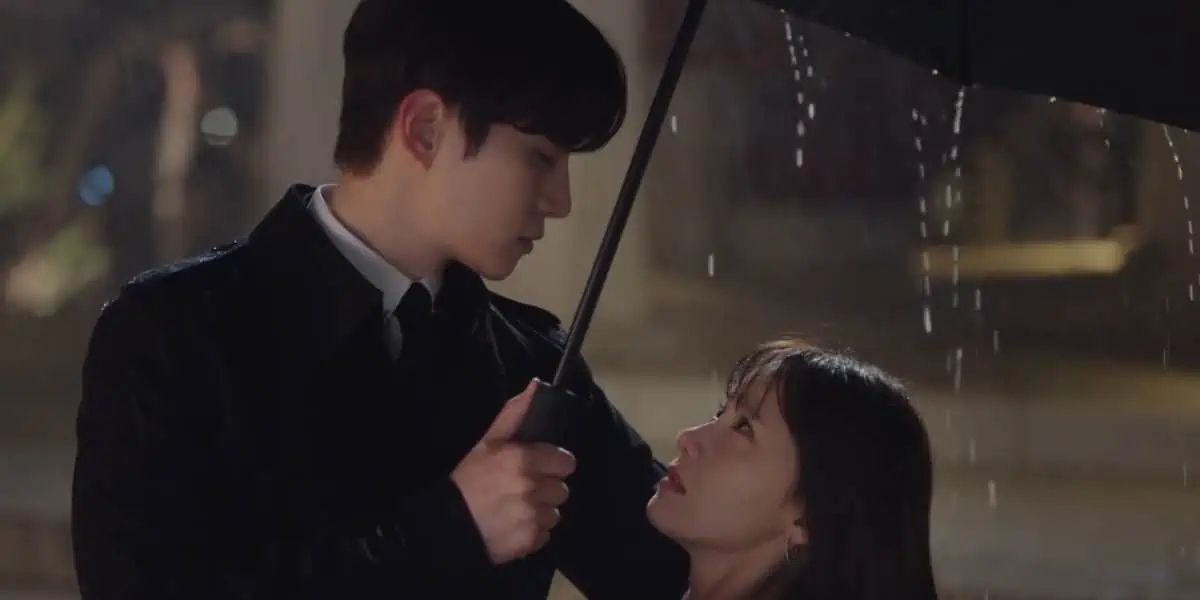King the Land is the number one international show on Netflix by a metaphorical landslide. When it comes to the numbers game, there’s no contest. The K-drama scored almost 5 million views in the last week alone and has spent six lucrative weeks in the Netflix Top 10, with approximately 65,100,000 total viewing hours to its name. In the land of streaming, that’s tantamount to world domination. What’s engaging audiences to such an extent? There’s something in the air with King the Land — and it’s love.
Described as a “classic rom-com” by its lead actors, King positions itself as a spiritual successor to K-drama rom-com classics like What’s Wrong With Secretary Kim and the Netflix original Business Proposal. Although King the Land favors the more traditional Secretary Kim model of earnest sweetness over Business Proposal‘s absurdly inventive highway to the same result, this is a romance meant to charm, delight, and soothe viewers’ hearts. It succeeds with a well-deployed use of archetypes, a self-aware subversion of said archetypes, and the actors’ sparkling chemistry. With an impeccably glamorous atmosphere and an innate understanding of how to manipulate a K-drama’s workings to perfection, King the Land fills the rom-com slot fans have been waiting for with bated breath. Currently airing in Korea and distributed by Netflix, this series has four episodes of its sixteen left before it concludes — making now the perfect time for a catch-up binge.
What Is ‘King the Land’ About?
King the Land‘s story kicks off in 2015. Thanks to a joyful childhood spent with her single mom at or near hotels, Cheon Sa-rang (Im Yoon-ah) dreams of working as a hotel concierge and bringing happiness to everyone she meets. She didn’t attend college, but her natural aptitude and cordial attitude win her an internship with the luxury King Hotel. It’s her dream job and remains so even when her guileless sincerity causes friction with her hostile coworkers: the acrimonious (and jealous) manager relegates Sa-rang to cleaning “butt sweat” off the gym equipment. But no employee can best Sa-rang’s resolute gumption. Fast-forward to 2022, and Sa-rang’s been promoted to the lobby staff and recognized with the “Best Talent” award for two years running. (That award doesn’t give her a raise, of course. It’s just a meaningless title meant to mollify the mistreated staff.)
From the beginning, Sa-rang is the quintessential everywoman. Her very real and recognizable struggles aren’t romanticized even when they’re occasionally played for “yep, I’ve been there” laughs. She’s required to wear high heels at work, and not only do they pain her feet, but they wear down until a heel breaks. Sa-rang must walk with a broken shoe because her financial limitations mean this crappy pair is all she can afford. She experiences sexual harassment and verbal abuse at work. She lives with her two best friends (also in the service industry) so they can split the rent.
All this means that Sa-rang is no starry-eyed idealist; she’s intimately familiar with how client-facing work bruises one’s well-being. Such realism doesn’t crush her lifelong desire to be a hotelier, however. She remains chipper and empathetic without demonstrating naivety. She’s witty, spunky, and confident in her self-sufficiency. Sa-rang is a woman who knows her worth — she breaks up with the boyfriend treating her like she’s a commodity and stands her principled ground against his insults. Moreover, King the Land makes it unignorably clear that it’s okay for a woman to want “more.” How refreshing! Combined with a pitch-perfect performance from Im Yoon-ah, an acclaimed actress as well as a member of the K-Pop group Girls Generation, Sa-rang fits the K-drama leading lady model but incorporates a modernized, conscious look at economic inequality.
In accordance with proper rom-com tradition, male lead Goo Won (Lee Jun-ho, also a boy band singer) is the snazzily dressed prodigal son of the King Group’s CEO. Naturally, he’s Sa-rang’s professional enemy turned love interest. He also finds himself in a succession battle with his older half-sister, Goo Hwa-ran (Kim Seon-young), who’s ambitious and conniving. Won’s technically the heir and takes over management duties of the King Hotel, but Hwa-ran lusts for complete power and wants that skinny lad gone.
How Does ‘King the Land’ Subvert K-Drama Expectations?
The rich chaebol jerk contrasting with the kind-hearted woman is almost as synonymous with K-dramas as you can get. King the Land excels in mindful acumen by quickly establishing that, while socially clueless and emotionally reserved, Won isn’t your typical elitist. There’s no learning to become a decent human being because he falls for a pretty girl; Won takes the initiative and corrects his privileged ignorance. He has no patience for elitism or duplicity, and he doesn’t hesitate to use his power to better working conditions for the King Hotel staff. His moodiness is part of his awkward charm.
Following a disastrous meet cute, Sa-rang and Won find the other impossibly irritating until the ice inevitably melts. King isn’t trying to do anything radical with the workplace romance: Sa-rang is sunshine incarnate and Won is the grumpy, “I don’t know how to have fun” socialite. Both leads lost their moms at a young age; Sa-rang’s beloved mother passed away, while the disappearance of Won’s is part of an unfolding mystery. Her unexplained abandonment explains the trauma he hides behind his aloof, cranky facade. (Example: Sa-rang’s job insists she always smiles for customers; Won despises inauthenticity.) Some of the outlandish situations strain believability and exist to pad out the sixteen-episode run time, but the couple’s lightning-in-a-bottle chemistry and genre-intuitive direction from Im Hyun-wook make up for any dry spells. This series knows exactly when to cue the sweepingly romantic soundtrack. Our hero must catch our heroine when she trips and hold her for an unnaturally long time as they stare at one another. Expertly timed slow-motion footage turns raindrops into a Renaissance painting. King the Land satisfies its niche and its ardent ridiculousness is superb without feeling stale.
Most delightful of all is how hard Won falls once he catches feelings. His crush on Sa-rang mystifies him to the point of taking a “do I like this person” personality quiz and Googling “how to date.” The professional power imbalance is never a concern because Won wouldn’t ever consider abusing it. He and Sa-rang fall in love as people separate from their work environment, and that equality allows them to grow and express their feelings healthily. In a steamy make-out scene my retinas will never forget, Won straight-up asks for permission before their first kiss. He learns to respect Sa-rang’s boundaries and respect her independence while still tending to her with dedication. He becomes the purest, most smitten boy imaginable; adoration oozes from his eyes.
Won’s benevolence is no coincidence. Jun-ho made headlines for refusing to yell at Sa-rang during an argument. “That’s too aggressive,” he said. “I’m concerned about two things. I’d like [the scene] to be not violent, and I also don’t want to raise my voice too much.” In response, fans dubbed him a “green flag ML” — if you’re not up on internet vernacular, that means he’s the perfect fictional man. Won drinks his respect women juice with every meal and wouldn’t know toxic masculinity if it punched him in the street. This egalitarian tenderness lets the romance crackle and melt in equal measure. Sa-rang and Won are each other’s number one fans and savor the quiet moments required to build a lasting partnership. There are also stolen kisses in hallways and sneaky hand-holding, and what more could you ask for?
In fairness, King the Land‘s romance did overtake the plot enough that some of the more unique aspects fell away. The initial episodes highlighted how Sa-rang and her roommates struggled financially, the unfair weariness of their service jobs, and their respective transitions from bright-eyed twenty-somethings to matured, confused thirty-somethings who still adore one another but are too exhausted to barhop like their glory days. But we’re here for the romance, and King the Land delivers endless smiles and enough charm to inflate a hot air balloon.
Stay connected with us on social media platform for instant update click here to join our Twitter, & Facebook
We are now on Telegram. Click here to join our channel (@TechiUpdate) and stay updated with the latest Technology headlines.
For all the latest TV News Click Here


